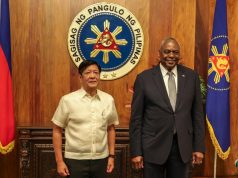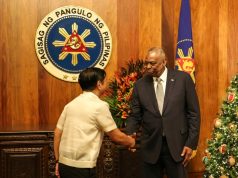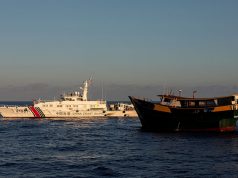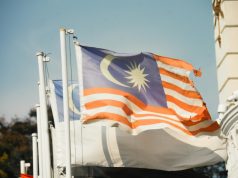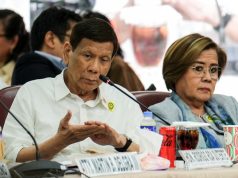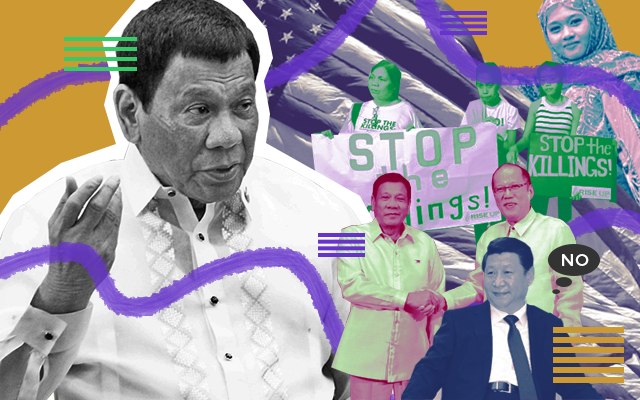
President Rodrigo Duterte’s recent remarks on Filipinos being hard to satisfy is the most recent deflection of criticism by the Philippines’ outspoken leader.
Duterte at a conference with businessmen in Jerusalem, Israel discussed his administration’s platform.
While citing some of the external threats his administration faced including the communist insurgency, terrorism in Southern Philippines and the drug problem, Duterte brought up how “problematic” Filipinos could also be.
“You cannot do good. It’s always wrong,” he reportedly said during the discussion.
He mentioned the criticism he received for use of crass language during speeches, particularly the criticism from the country’s higher income population.
A growing list of external factors
Duterte, whose campaign platform was largely built on promises to eradicate crime, weed out corruption in the government and put an end to the growing drug trade, has cited numerous external factors that have impeded the immediate completion of his administration’s objectives.
In a speech at the Philippine Military Academy Alumni Homecoming in February 2017, Duterte blamed the “wrong decisions” of previous administrations for worsening poverty in the country.
Duterte has also justified his directive to the police to continue its crackdown on the drug trade in the country as part of his campaign promise of erasing the drug problem, despite the continuing discovery of drug shipments.
He has pointed to the existence of Taiwan-based gangs that set up shop in the Philippines as having worsened the drug problem.
Human rights groups, foreign governments, communist insurgents and opposition leaders over the years have criticized Duterte’s war on drugs, to which more than 20,000 killings have been tied to.
The government recently filed drug charges against Kerwin Espinosa and Peter Lim, two suspected big time drug lords.
The 73-year old chief executive has also blamed external factors in pressing issues outside of his core agendas.
He blamed the world’s largest economies for contributing to climate change in March 2018.
Known for being more critical of traditional ally United States compared to previous administrations, Duterte has also blamed the West for the spread of terrorism, citing the US’ exploitation of the oil reserves of Arab countries at the expense of the locals.
He has also laid the blame on the administration of his predecessor Benigno Aquino III for failing to protect the country’s maritime sovereign rights in the disputed area in the West Philippine Sea after territorial rival China refused to honor the UN Tribunal decision that awarded those same rights to the Philippines during Aquino’s term.
A recent jibe blaming the beauty of Davao women for the high incidence of rape in the city where Duterte served as mayor for around two decades has also received much backlash from his critics and women’s rights groups.
What critics are blaming
Critics of his administration have scored Duterte and his economic managers for being unable to solve the Philippines’ economic woes after the inflation rate surged to 6.4 percent in early September 2018.
food inflation is 8.6%
transport is 10.2%next time i see a poll saying people are still very happy with duterte performance, i'm going to have to punch some people in the face https://t.co/j52BMhIglj
— peanutty (@xpeanutgalleryx) September 5, 2018
Sure, let us applaud the lord for:
23,000 dead – 4,000 by cops;
Some 400,000 displaced in Marawi, now reduced to rubble;
Decade-high inflation and a President who sneers at our poverty;
Corrupt officials playing hopscotch across the bureaucracy;
https://t.co/88dvZJ5Sor— inday espina varona (@indayevarona) September 5, 2018
Duterte has also been accused of being motivated by political vendetta in ordering the nullification of the amnesty granted by the previous administration to Sen. Antonio Trillanes, a former mutineer who became of one of Duterte’s biggest critics in the legislature.
So obvious it's a political vendetta, in retaliation to the expose and pursuit of Trillanes of that anomalous security agency contracts connected to Calida. ???
Ganyan na sila kagarapal.#IStandWithTrillanes
— Eitana B (@eitana_b) September 4, 2018
Despite recent controversies, Duterte still remains the most popular leader in recent administrations, according to a survey in July 2018.





